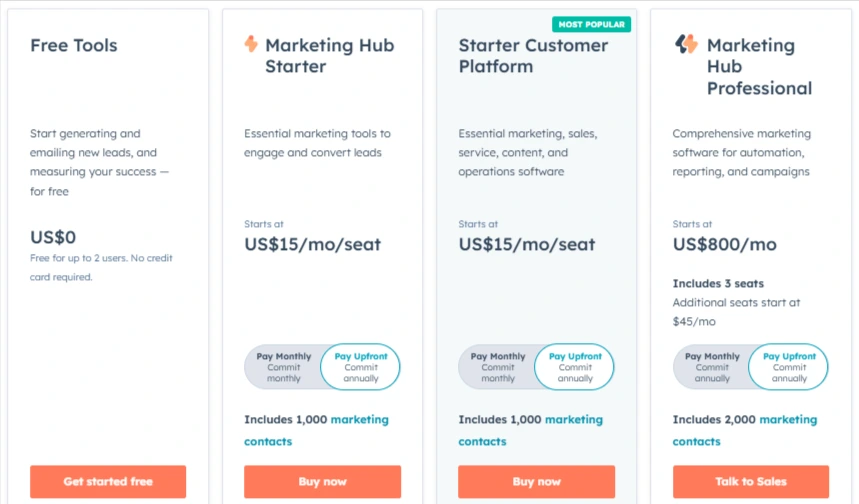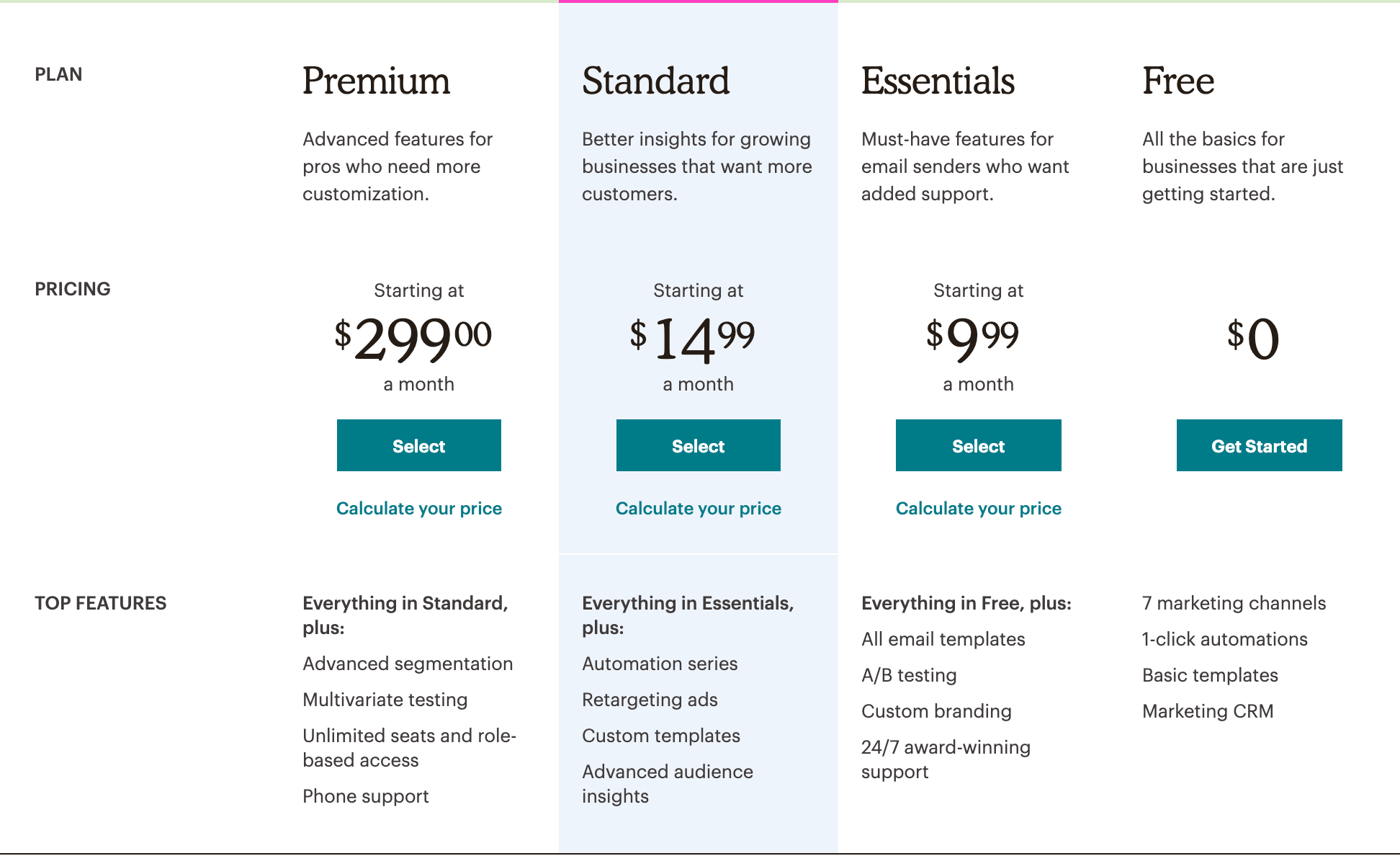Best For | Best for managing customer relationships and growing businesses with integrated tools. | Best for small businesses needing affordable, easy email marketing and automation. |
Price | $15/mo | $9.99/month |
Free Trial/Free Plan | Free Plan Available | Free Plan Available |
Features | Tracks customer interactions. | Customizes email campaigns. |
Pros | Free plan available. | Affordable pricing options. |
Cons | Advanced features costly. | Limited CRM functionality. |
Choosing between HubSpot CRM vs MailChimp can feel tricky. Both tools help businesses grow, but they do it in different ways. If you need a full customer management system with sales tools, HubSpot CRM might be the better choice. But if you mainly focus on email marketing, MailChimp could be just what you need.
I’ve used both, and I get why people struggle to decide. HubSpot is great for keeping track of leads and automating tasks, while MailChimp makes sending email campaigns super easy. The right one depends on what your business needs most.
In this comparison, I’ll break down their features, pricing, and ease of use—so you can choose the best one for you!
About HubSpot
Since its founding in 2006, HubSpot has become one of the world’s leading providers of inbound marketing and sales software.
The company’s CRM (customer relationship management) product is a comprehensive tool that helps businesses manage their customer interactions, track leads and prospects, and measure marketing results.

HubSpot CRM is a cloud-based solution that can be accessed from any device with an internet connection. It’s easy to use and can be customized to meet the unique needs of any business.
The software includes features such as lead capture and tracking, contact management, email marketing, reporting and analytics, and more.
About MailChimp
MailChimp is an email marketing service that allows businesses to create and send newsletters, promotional emails, and other types of email campaigns. It’s one of the most popular email marketing services available, and it’s easy to use.

With MailChimp, you can create email campaigns, manage subscriber lists, track campaign results, and more. It also offers a variety of features, such as customizable templates, A/B testing, autoresponders, and more.
HubSpot CRM vs MailChimp: Key Features Comparison
Alright, let’s break this down in a way that actually makes sense. If you’re running a business, you need two big things:
- A way to keep track of your customers, manage relationships, and organize your sales process (that’s what a CRM does).
- A way to send emails, run marketing campaigns, and keep your audience engaged (that’s where email marketing comes in).
That’s where HubSpot CRM and MailChimp come into play. They seem similar on the surface, but they actually serve very different purposes. So let’s compare them based on what they do best.
1. Managing Your Customers & Contacts
- HubSpot CRM: Think of this like a smart digital rolodex that keeps track of all your customer details—emails, calls, website visits, and even how close they are to making a purchase. It’s great if you need a system to manage relationships and stay organized.
- MailChimp: It stores customer emails, but it’s more focused on sending emails rather than tracking every interaction. It’s not really built to manage customers beyond email campaigns.
👉 If you need a tool to manage customer relationships, HubSpot wins.
2. Email Marketing & Automation
- HubSpot CRM: It lets you send emails and automate follow-ups, but it’s not as full-featured as a dedicated email marketing tool. If you want advanced features, you’ll need to pay for HubSpot’s Marketing Hub (which can get pricey).
- MailChimp: This is where MailChimp shines. It’s a beast when it comes to email marketing. You can create beautiful newsletters, segment your audience, set up automated sequences (like welcome emails or abandoned cart emails), and even A/B test different versions.
👉 If email marketing is your main focus, MailChimp is the better option.
3. Sales Tracking & Lead Management
- HubSpot CRM: If you have a sales process, HubSpot is built for this. It lets you track leads, manage deals, schedule meetings, and even set reminders to follow up with potential customers.
- MailChimp: It’s not built for sales tracking. You can see who opened your emails, but it doesn’t track where a customer is in your sales funnel.
👉 If you have a sales team or need lead tracking, HubSpot is the way to go.
4. Automation & Workflows
- HubSpot CRM: You can create automated workflows that send follow-up emails, assign leads to your sales team, or even trigger notifications when a contact visits your website.
- MailChimp: Focuses on email automation, like sending a welcome email when someone subscribes or a discount email if they abandon their cart.
👉 Need business-wide automation? Go with HubSpot. Just need email automation? Stick with MailChimp.
5. Reporting & Analytics
- HubSpot CRM: Gives you deep insights into your sales pipeline, customer interactions, and even how your emails are performing. If you like tracking numbers, you’ll love this.
- MailChimp: Has strong email analytics—you can see who opened your emails, clicked links, and which campaigns perform best.
👉 HubSpot is better for overall business analytics, while MailChimp is better for email-specific insights.
6. Integrations & Compatibility
- HubSpot CRM: Plays nice with over 1,000 apps, including Gmail, Outlook, Shopify, and Salesforce.
- MailChimp: Connects with e-commerce platforms like Shopify and WooCommerce, as well as social media ad platforms like Facebook and Google Ads.
👉 Both have great integrations, but HubSpot is better if you need CRM-level connections.
7. Pricing & Affordability
- HubSpot CRM: The basic CRM is free forever (which is amazing), but if you want advanced marketing tools, you’ll need to pay—and the costs can add up quickly.
- MailChimp: Free for up to 500 contacts, and paid plans start at $13/month. It’s cheaper for email marketing, but it doesn’t offer the full CRM functionality of HubSpot.
👉 MailChimp is cheaper for email marketing, but HubSpot gives you a more complete system (especially for free).
8. Ease of Use
- HubSpot CRM: Super intuitive, but since it’s a full CRM, there’s a bit of a learning curve.
- MailChimp: Easier for beginners—especially for email campaigns, with a simple drag-and-drop editor.
👉 If you want a tool that’s simple and quick to learn, MailChimp is easier. If you need powerful features, HubSpot is worth learning.
9. Customer Support
- HubSpot CRM: Offers email, chat, and phone support, but only on paid plans.
- MailChimp: Limited support on free plans; live chat and phone support are only available for paid users.
👉 Both limit support on free plans, but HubSpot has better resources for troubleshooting.
10. Scalability – Will It Grow with Your Business?
- HubSpot CRM: Great for scaling—as your business grows, you can add more advanced tools.
- MailChimp: Best for small businesses focused on email marketing. If you need more than email, you might outgrow it.
👉 If you’re planning to grow your business, HubSpot is the smarter long-term choice.
Pricing Plans: HubSpot CRM vs MailChimp
HubSpot CRM Pricing

1. Free Tools
HubSpot gives you free tools to find new leads, email them, and track your success—all without paying. It’s called the Free Tools plan and costs US$0. You can use it with up to 2 users, and you don’t need a credit card to start. This plan includes free marketing, sales, service, content, operations, and commerce tools. It’s perfect if you want to try HubSpot without spending money.
2. Starter Plans
These plans are for growing businesses that need more features at a low price.
- Marketing Hub Starter: Costs US$15/month per user if paid yearly (or $20/month if paid monthly). It includes 1,000 marketing contacts. You can remove HubSpot’s logo from emails, forms, and live chat. It also has simple automation, messaging insights (still in testing), and email/chat support.
- Sales Hub Starter: $20/month per user. Includes email tracking and meeting scheduling, with no HubSpot branding.
- Service Hub Starter: $20/month per user. Offers basic customer service tools like live chat and email, without branding.
- Content Hub Starter: $20/month per user. Comes with premium hosting, security, and a drag-and-drop builder for websites.
- Operations Hub Starter: $20/month per user. Helps you organize data with custom fields and mappings.
3. Professional Plans
These are for businesses that want advanced tools and can grow with them.
- Marketing Hub Professional: Starts at US$800/month with 2,000 marketing contacts and 3 users. Extra users are $45/month each. You pay yearly, and there’s a $3,000 setup fee. It includes automation across channels, dynamic personalization, social media tools, custom reports, teams, Breeze social agent (in testing), lead scoring, and SMS marketing (extra cost).
- Sales Hub Professional: $100/month per user, with a $1,500 setup fee and yearly payment. Offers sales automation, custom reports, and eSignature.
- Service Hub Professional: $100/month per user, with a $1,500 setup fee and yearly payment. Includes help desk tools, surveys, and a customer portal.
- Content Hub Professional: $500/month for 3 users, with extra users at $50/month. Has smart content, SEO tools, and A/B testing. Paid yearly.
- Operations Hub Professional: $800/month for 1 user, with extra users at $50/month. Offers advanced automation and webhooks. Paid yearly.
4. Enterprise Plans
These are for big companies with complex needs.
- Marketing Hub Enterprise: Starts at $3,600/month with 10,000 marketing contacts and 5 users. Add 10,000 contacts for $100/month or users for $75 each. Setup fee is $7,000. Includes custom tools, lead scoring, and team permissions.
- Sales Hub Enterprise: $150/month per user, with a $3,500 setup fee. Offers custom tools, scoring, and permissions.
- Service Hub Enterprise: $150/month per user, with a $3,500 setup fee. Includes permissions, goals, and custom tools.
- Content Hub Enterprise: $1,200/month, with features like memberships and custom tools. Paid yearly.
- Operations Hub Enterprise: $2,000/month for 1 user, with extra users at $75/month. Includes data tools and automation. Paid yearly.
5. Customer Platform Bundles
HubSpot offers packages that mix different tools at a lower price.
- Starter Customer Platform: Combines Starter plans for Marketing, Sales, Service, Content, Operations, and Commerce Hubs. Costs $20/month per user, or $15/month if paid yearly. No yearly commitment needed unless you want the discount.
- Professional Customer Platform: Starts at $1,781/month, bundling Professional editions of multiple Hubs for bigger businesses.
Mailchimp Pricing
MailChimp offers up to 2,000 subscribers and 12,000 mail per month. But you will have to pay for selecting a plan other than the free plan, which depends on the number of subscribers.
It offers subscriber-based as well as a pay-as-you-go pricing model. The plans offer varying degrees of features starting at:
- $9.99/month for 500 subscribers (Essential Plan)
- $14.99/month for 500 subscribers (Standard Plan)
- $299/month for 10,000 subscribers (premium plan)
Pros and cons: HubSpot CRM vs MailChimp
HubSpot
Pros
- Free plan offers many features.
- Interface is simple to navigate.
- Scales well as business grows.
- Support team helps you quickly.
- Boosts productivity with automation tools.
- Integrates easily with other apps.
Cons
- Advanced tools cost too much.
- Setup can feel time-consuming initially.
MailChimp
Pros
- Pricing fits small budgets nicely.
- Beginners find it super easy.
- Emails reach inboxes reliably always.
- Templates offer lots of variety.
- Setup is fast and simple.
- Automation saves time every day.
Cons
- CRM features are very limited.
- Deep automation lacks real power.
FAQs About HubSpot CRM vs MailChimp
What’s the biggest difference between HubSpot CRM and MailChimp?
HubSpot CRM helps you manage customers and sales with lots of tools. MailChimp is mostly for sending emails and simple marketing. If you want a full business tool, pick HubSpot. If you just need emails, go with MailChimp.
Can I use both HubSpot CRM and MailChimp together?
Yes! HubSpot CRM tracks customers, and MailChimp sends emails. They connect easily, so you can use HubSpot to manage contacts and MailChimp to email them.
Which tool is easier for beginners?
MailChimp is simpler because it’s just for emails and quick to learn. HubSpot CRM has more tools, so it takes a bit longer to figure out, but free guides help.
Does HubSpot CRM do email marketing like MailChimp?
Yes, HubSpot CRM has email marketing in its free and paid plans. It’s not as fancy as MailChimp’s email designs, but it works well for basic campaigns.
Can MailChimp help me track my sales?
Not really. MailChimp focuses on emails and some marketing stats. It doesn’t track sales or customers like HubSpot CRM does with its sales tools.
Which one is better for a growing business?
HubSpot CRM grows with you—it adds more tools as you need them. MailChimp is great for small teams but doesn’t expand as much for big business needs.
Can I automate things with both tools?
Yes, but they’re different. HubSpot CRM automates sales and customer tasks. MailChimp automates emails, like welcome messages, but not much else.
Quick Links:
- Madgicx vs Mailchimp
- Why Use Hubspot
- Omnisend Shopify Tutorial
- Best WordPress Email Marketing Plugins For Better Engagement
- Aweber Vs. MailChimp
- Digital Marketing Experts Roundup
Conclusion : HubSpot CRM vs MailChimp 2026
In the end, HubSpot CRM and MailChimp are both great products with their own unique strengths. If you’re looking for a powerful CRM that can handle all of your sales and marketing needs, HubSpot is definitely the way to go.
But if you’re mainly interested in email marketing and want a tool that’s easy to use and has lots of templates and integrations, MailChimp is a good choice.
Whichever product you decide on, make sure to take advantage of the free trials they offer so you can explore all of their features and find the one that best suits your business. Thanks for reading!



